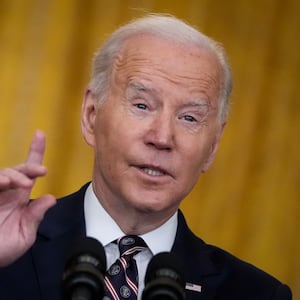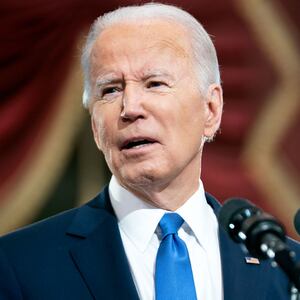Less than 10 months ago, President Joe Biden came before Congress and laid out an ambitious domestic agenda: expanded family leave, action on climate change, and trillions in new social spending—all paid for with increased taxes on the richest Americans.
With much of that agenda dead, his approval rating near record lows, and a Russian invasion of Ukraine suddenly seizing the attention of both the administration and an anxious world, Biden pivoted to an address heavy on foreign policy Tuesday night that could mark a bit of a reset for his presidency.
The president still discussed longtime aspects of his domestic agenda, from infrastructure spending—the result of one of his few key legislative victories—to pushes for lower insulin prices.
ADVERTISEMENT
But rather than front-loading proposals on increased social spending on programs liberals love—like better child care, less expensive health care, free college tuition and universal pre-Kindergarten—Biden conspicuously focused on GOP-friendly issues like crime, keeping schools and businesses open, and repatriating American manufacturing jobs that had gone overseas.
Even his historic nomination of Judge Ketanji Brown Jackson to replace retiring Justice Stephen Breyer, and a call for action on voting rights legislation, garnered just passing mentions.
Instead, Biden adopted plenty of GOP rhetoric. He called to “secure our borders” and specifically denounced the “defund the police” battle cry—the latter earning him one of the few standing ovations from the right side of the chamber on Tuesday night.
There was also no mention by name of the “Build Back Better Act,” which seems to have suffered a slow but final death as Sen. Joe Manchin (D-WV) insists he just can’t get behind any version of the bill.
Regardless, the heart of Biden’s address was the crisis in Ukraine.
Biden said that, six days ago, Russian President Vladimir Putin “sought to shake the foundations of the free world, thinking he could make it bend to his menacing ways.”
“But he badly miscalculated,” Biden continued. “He thought he could roll into Ukraine and the world would roll over. Instead, he met a wall of strength he never imagined. He met the Ukrainian people.”
Biden said Putin thought the West and NATO wouldn’t respond to his invasion of Ukraine, that he could “divide us at home.”
“We countered Russia’s lies with truth. And now that he has acted, the free world is holding him accountable,” Biden said.
The president credited the efforts of NATO and other countries to isolate Russia, implement economic sanctions, and choke off access to technology. He also repeatedly praised the efforts of the Ukrainian people to fend off Russian attacks.
The biggest applause line of the night was for the Ukrainian ambassador to the United States, and members on both sides of the aisle were decked out in blue and yellow garb in support of Ukraine.
In many ways, the enthusiastic rallying for Ukraine gave Biden a new chance at bipartisanship.
According to one source familiar with the initial plans for the address, the president’s remarks were initially going to focus more on domestic matters: the fight to end the coronavirus pandemic’s chokehold on American life, the resurgence of American employment, and the trillion-dollar infrastructure package that, Biden said on Tuesday night, “is going to transform America and put us on a path to win the economic competition of the 21st century.”
But the Russian invasion, as well as Ukraine’s remarkable response to its attempted occupation, prompted a swift pivot to emphasizing what Biden referred to in his first joint address to Congress last year as the greatest challenge of his presidency: proving that democracy works.
“America’s adversaries—the autocrats of the world—are betting we can’t,” Biden said at the time.
On Tuesday night, Biden followed up on those remarks and said America and its democratic allies had proved that they could.
“We see the unity among leaders of nations and a more unified Europe, a more unified West,” Biden said.
Nearly every item of his address had an international angle—from talking about his infrastructure bill to trumpeting a 130-country international agreement to create a global minimum tax rate for corporations.
“So companies can’t get out of paying their taxes at home by shipping jobs and factories overseas,” Biden said.
But once Biden moved into more traditional domestic policy areas, like a laundry list of liberal woulda-coulda-shoulda legislative priorities—including “the onslaught of state laws targeting transgender Americans,” and “protecting the rights of women”—Republicans visibly, sometimes quite audibly, registered their discontent.
At one point, Biden mentioned burn pits that had caused severe symptoms for members of the military and even yielded flag-draped coffins for servicemembers—his son, Beau, potentially among the dead. Rep. Lauren Boebert (R-CO) shouted out, “You put them in, 13 of them,” referring to the total number of U.S. casualties in Afghanistan in 2021 as the United States left the country.
The ill-timed comment drew a round of boos from Democrats.
Boebert also tried (and failed) to get a “Build the wall!” chant going, after Biden spoke positively about border security. Rep. Marjorie Taylor Greene (R-GA) was the only member to join in, once again drawing derision from Democrats.
"Sit down," one Democrat calmly said.
The roughly one-hour-and-10-minute speech was well-received by Democrats, even if Biden’s softer tone and COVID restrictions that spaced out members had muted some of the energy on the House floor.
Still, Biden leaned on a recent rush of patriotism in response to the Ukrainian crisis to drive home his central message: “We are stronger today than we were a year ago. And we will be stronger a year from now than we are today.”
“Now is our moment to meet and overcome the challenges of our time,” he said.









